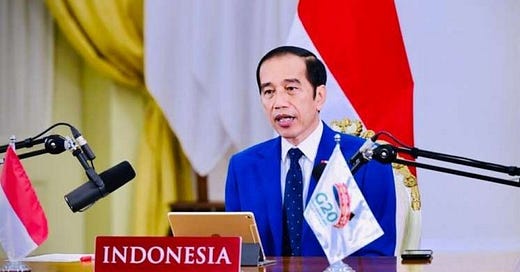By: Muhammad Zulfikar Rakhmat
The 2022 G20 Summit scheduled for Bali in October increasingly risks turning into a free-for-all, with both warring Presidents Vladimir Putin of Russia and Volodymyr Zelensky of Ukraine vowing to attend, the United States possibly boycotting, and China sternly telling Jakarta the summit should stick to economic issues and forget politics.
“It’s turning into a total ratf***k,” a well-connected observer said. “Jakarta is worried about the session falling apart. Jokowi wants it to be a trade fair promoting Indonesia. Big business will be staying away, I suspect.”
China Foreign Minister Wang Yi told his Indonesian counterpart Retno Marsudi by phone last week that Indonesia, the 2022 host for the conclave of the world’s 20 most economically important nations, should focus more on economic issues in accordance with the objectives of the G20, rather than discussing political and security issues.
"China firmly supports Indonesia in playing its role as president, eliminating interference to achieve the goals of the agenda that has been set, and leading the G20 in the right direction," the Chinese Foreign Ministry statement said. But, Wang said, “President Joko Widodo has reiterated that since its formation, the G20 is an economic forum, not a political forum, and China fully agrees with him on this.”
There has been no indication from the palace in Jakarta whether Indonesia is showing resentment against China’s efforts to intervene in its G20 leadership. International law expert Hikmahanto Juwana told Benar News that Jakarta needs to uphold its foreign policy principles and that Indonesia's stance is correct in inviting all members of the G20 without exception.
China's request is not surprising given Beijing's foreign policy alignment with Russia although Indonesia clearly has no obligation to have to accommodate Wang Yi's wishes. But China’s influence has been growing sharply in Indonesia through its massive trade surplus and growing foreign direct investment, which in 2020 reached US$2 billion annually. The 150-km Jakarta-Bandung High-Speed Train project is China’s most important Belt and Road Initiative venture in Indonesia, if not Southeast Asia although bad planning and cost overruns have driven the bill for the project to as high as US$6 billion. Tensions in the Natuna area have risen, with China demanding that Indonesia stop drilling in its own waters.
Western nations led by the United States pressed Widodo to invite Zelensky in the wake of Indonesia’s decision to also invite Putin, who has confirmed he will attend. The western countries had demanded that Russia, a member of the G20, be excluded following its February 24 invasion of Ukraine, but Indonesia argued it must remain "impartial."
The United States apparently is now undecided whether to attend. Washington earlier responded to Indonesia’s announcements by saying the world cannot deal with Russia as it did before the invasion.
"The United States continues to believe that it can't be business as usual with regards to Russia's participation with the international community or international institutions," State Department deputy spokeswoman Jalina Porter told reporters in response to a question about the invitation. She did not comment on what the United States would do. If the US does boycott, the European Union, which is also a member as a whole, then faces its own decision. Germany and the UK have both strongly backed Ukraine in the war.
Whatever stances the opposing nations take, the session is likely to be a mess. When Indonesia assumed the leadership last December, the G-20 annual parley was regarded mostly as a pleasant interlude for the world’s government leaders to convene to bloviate about issues related to the global economy such as sustainable development and financial stability in a pleasant location. Indeed, Indonesian officials were looking forward to an agenda on the “Global Health Architecture, Sustainable Energy Transition, and Digital Transformation.” Now that is secondary. While the G20 may be focused on economic and not political issues, Russia’s actions, with its brutal invasion of its neighbor Ukraine, are threatening at least as much global economic damage as the Covid-19 pandemic.
But like most major emerging economies, the government has tried to maintain a neutral position on the Ukraine invasion. Jokowi, as the president is universally known, responded to a request from Zelensky by saying Indonesia would offer humanitarian aid. He has publicly called for an immediate end to hostilities and stressed the need for a "peaceful solution” and did so recently in a phone call with Japanese premier Fumio Kishida.
"An infringement on sovereignty and territorial integrity through the use of force and intimidation, as well as an attempt to unilaterally change the status quo by force, are unacceptable in any region," he was reported as saying.
The Ukrainian ambassador in Jakarta said the economic impact of Western sanctions on Russia and supply chain cuts were important issues facing the global economy.
Wang said that since the beginning of this year, Chinese President Xi Jinping and Jokowi Widodo have held two telephone talks and recorded an “important consensus.”
Muhammad Zulfikar Rakhmat is a lecturer at Universitas Islam Indonesia



